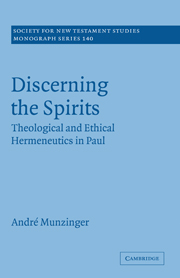Book contents
- Frontmatter
- Contents
- Preface
- Abbreviations
- Part I Introduction
- Part II What Requires Discernment? The Objects of Evaluation
- 2 The Discernment of Ethical Questions
- 3 The Discernment of Spirits
- 4 Discerning All Things: The Structure of Paul's Epistemology
- Part III How Can and Should True Discernment Take Place?
- Part IV Conclusion
- Bibliography
- Author Index
- Passage Index
- Subject Index
4 - Discerning All Things: The Structure of Paul's Epistemology
Published online by Cambridge University Press: 26 October 2009
- Frontmatter
- Contents
- Preface
- Abbreviations
- Part I Introduction
- Part II What Requires Discernment? The Objects of Evaluation
- 2 The Discernment of Ethical Questions
- 3 The Discernment of Spirits
- 4 Discerning All Things: The Structure of Paul's Epistemology
- Part III How Can and Should True Discernment Take Place?
- Part IV Conclusion
- Bibliography
- Author Index
- Passage Index
- Subject Index
Summary
Introduction
ὁ δὑ πνευματικᾐς ἀνακρίνει [τὰ] πάντα
(1 Cor. 2.15a).Is Paul really serious? Or is he quoting a Corinthian catch phrase? Is it merely the mandate to discern all ‘spiritual’ knowledge or a new all-encompassing epistemological potential? In any case, this statement calls for our attention. Gordon Fee has proposed that the whole of 1 Corinthians is a spelling out of this statement. My own argument will broaden this assertion: I propose that discernment reflects Paul's theologising as a whole and his expectation for the believers' comprehension of his theology.
In order to substantiate this claim we must investigate the epistemological structure of Paul's thought generally. That means studying the formation and verification of truth in his theology. Further, we must arbitrate between conflicting approaches to Paul: can the truth of the gospel be nailed down to certain propositions, as O. Hofius has claimed? Or is it merely the existential decision to realise a truth claim, as Bultmann and his school proposed? How objective and foundational is the truth claim?
My procedure will be as follows: first I will review some proposals in recent literature concerning how Paul developed his theology. By way of contrast, I will present my own argument for a depiction of the structure, limits and scope of Paul's epistemology. Then I will delineate the vital role discernment plays in signifying and verifying meaning within the portrayed structure.
- Type
- Chapter
- Information
- Discerning the SpiritsTheological and Ethical Hermeneutics in Paul, pp. 75 - 98Publisher: Cambridge University PressPrint publication year: 2007



